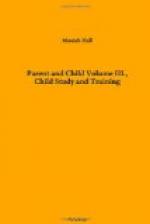So much energy is required for physical growth that in the early stages of this period difficult mental tasks cannot be well done. In a young man especially, this period is marked by awkward, uncouth movements that indicate uncertain adjustment. Frequently at this time the boy’s voice varies unsteadily from a high falsetto to a low pitch, which is most mortifying to the youth, who is now bashful probably for the first time in his life. The girl is suddenly very particular about her appearance, and her clothes, and the youth for the first time delights in a starched shirt, patent leather shoes and bright neck-ties.
The health of the individual at this time is usually good; susceptibility to the diseases peculiar to childhood is slight, but there is increased danger of acquiring adult diseases, and some writers claim that it is during this time, when there are great physical disturbances, that the germ of many adult diseases, such as tuberculosis, are apt to be implanted. During the early part of this period it is unwise and dangerous for girls to take part in such strenuous athletic games as basketball, or for boys to indulge in football. Later when strength and equilibrium have been restored, these games may be practiced without danger.
But the greatest of all changes, the one fundamental to adolescent life, is the development of the sex instincts. Fortunate is the youth or maiden whose parents are sensible and wise enough to instruct them concerning the nature and purpose of these functions. Good books, such as “What a Boy Should Know,” and “What a Girl Should Know,” are invaluable during this critical time. This sudden ripening of the sex instinct is the cause of the metamorphosis from childhood to early manhood and womanhood, and is the key which explains the changes that characterize adolescence.
Emotionally, there is a tremendous awakening. The individual begins to feel for the first time that he is actually alive and living; heretofore, life has been a self-centered, matter-of-fact existence; now it enlarges and becomes charged with intense feeling and significance. “Fear, anger, love, pity, jealousy, emulation and ambition are either new-born or spring into intense life.”—James. All of these may be termed social instincts and they imply a widening of the youth’s horizon and include a “consciousness of kind” that has heretofore been lacking.
Now, the youth or maiden truly falls in love; up to this time, regard for the opposite sex has been merely a light fancy, barely skin deep; but now it takes hold of the heart strings and plays upon them with an agony that is truly heart rending. Who is there with red blood in his veins that does not look back upon his first heart conflict with almost pathetic reverence? Parents should be more concerned than they usually are over the conquest of the heart of youth. Such affairs may carry with them consequences which are more serious than could be anticipated.




